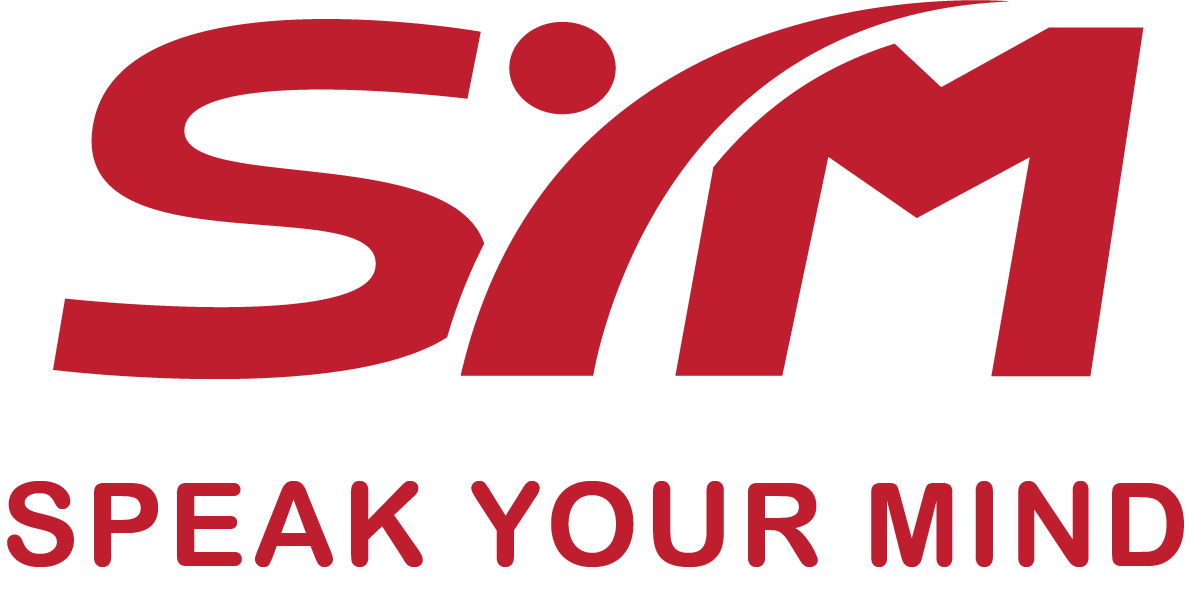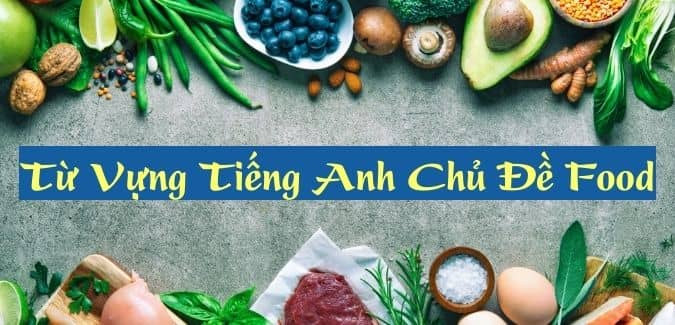Bên cạnh chủ đề Family, Tính cách, các mối quan hệ thì Từ vựng tiếng anh chủ đề Food là chủ đề tiếp theo SYM English muốn giới thiệu đến với các bạn. Bên cạnh từ vựng chủ đề Food cũng thường xuyên được dùng trong hội thoại hàng ngày để nói về đồ ăn. Có những loại thức ăn nào? các món ăn được miêu tả như thế nào? từ vựng chủ để cooking thì nói ra sao?
Đừng lo, trong bài viết này SYM English sẽ giúp bạn biết các từ vựng thường gặp của chủ đề này để các bạn ghi nhớ dễ hơn. Từ vựng đã được dịch chi tiết để các bạn có thể áp dụng dễ dàng hơn.
Xem thêm:
70 Từ vựng tiếng anh về tính cách
60 Từ vựng tiếng anh chủ đề mối quan hệ
Contents
Từ Vựng Tiếng Anh Chủ Đề Food
Từ vựng về Vegetable & Fruit
>>>>Tải bản trọn bộ 500+ từ vựng các chủ đề về quần áo, gia đình, mối quan hệ TẠI ĐÂY
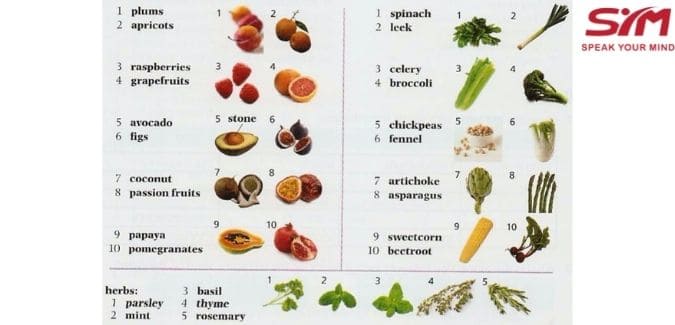
Từ vựng về Meat, Fish & Seafood
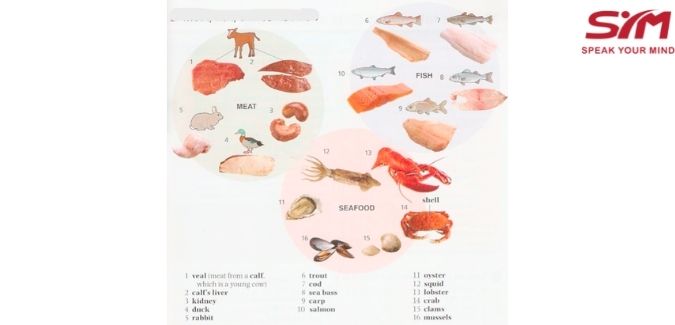
II. Từ Vựng Tiếng Anh Chủ Đề Food – Tính từ mô tả
>>>>Tải bản trọn bộ 500+ từ vựng các chủ đề về quần áo, gia đình, mối quan hệ TẠI ĐÂY
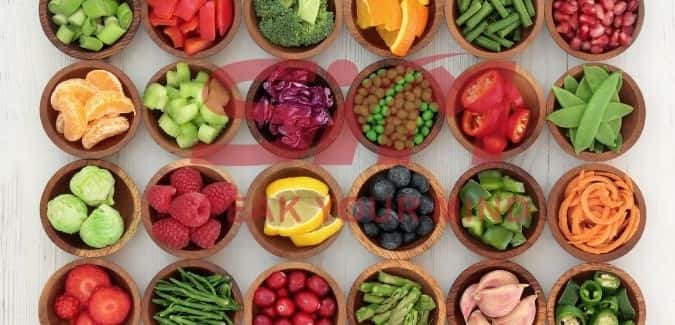
Adjectives To Describe Flavors and Tastes ( Tính từ mô tả hương vị và mùi vị)
- Be sweet: having a taste similar to that of sugar; not bitter or salty (ngọt)
- Be bitter: sharp/unpleasant (đắng)
- Be sour: having a sharp, sometimes unpleasant, taste or smell, like a lemon, and not sweet, e.g. unripe fruit (chua)
- Be hot, spicy (containing strong flavours from spices, e.g. curry: đậm đà, nhiều gia vị)
- Be mild: used to describe food or a food flavour that is not very strong (có vị thanh nhẹ)
- Be salty: having a lot of salt (mặn)
- Be sugary: having a lot of sugar (ngọt)
- Be sickly: too much sugar (ngọt khé cổ)
- Be savory: pleasant, slightly salty or with herbs (thơm ngon)
- Be tasty: having a good taste/flavor (đậm đà, ngon)
- Be tasteless: having no flavor at all (vô vị)
- Be bland: having a strong taste or character or not showing any interest or energy (nhạt nhẽo, vô vị)
- Be delicious: having a very pleasant taste or smell (rất ngon)
- Be out of the world: extremely good (tuyệt cú mèo, rất ngon, tuyệt vời)
General Appearance, Presentation and Quality (Vẻ bề ngoài, Cách bài trí và chất lượng)
- These chips are terribly greasy/oily. (too much oil / fat: nhiều dầu, mỡ)
- This meat is overcooked/overdone. ( to cook food for longer than necessary, reducing its quality as a result: nấu chín quá) >< under-cooked / underdone (cooked for only a short time, or for less time than is necessary: nấu quá lâu, chín kỹ quá)
- British cooking can be very stodgy. (heavy, hard to digest: khô, khó nuốt)
- Mm, this chicken’s done to a turn. (just perfect, not overdone: chín tới, không bị chín quá)
- These pistachio nuts are terribly moreish. (making you want to eat more: rất ngon, làm ai đó muốn ăn thêm)
III. Từ Vựng Tiếng Anh Chủ Đề Food – Cooking
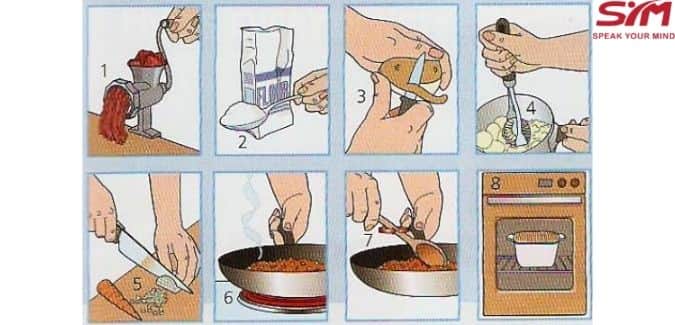
Từ vựng về Cooking ( Nấu Nướng)
Recipe for cottage pie (Công thức cho món bánh nhà tranh)
Ingredients (Thành Phần)
- 300g minced beef (300 gram thịt bò xay)
- 300g potatoes (300 gram khoai tây)
- 1 large onion (1 củ hành lớn)
- 1 carrot (1 củ cà rốt)
- 2-3 chopped tomatoes (2-3 quả cà chua cắt nhỏ)
- 300 ml beef stock (300ml bò kho)
- 1 tablespoon of flour (1 thìa cafe bột)
- Butter, salt, and pepper (bơ, muối và hạt tiêu)
|
- A recipe: a set of instructions for cooking sth ( công thức nấu ăn)
- An ingredient: the food items you need to have to make sth to eat (nguyên liệu nấu ăn)
- Stock: water with added flavor of meat, fish, or vegetables (nước dùng từ thịt, cá, …)
- To boil sth: cook sth in water, usually in a saucepan (luộc)
- To fry sth: cook sth in oil, usually in a frying pan (chiên)
- To add sth: put sth together with sth else (thêm cái gì)
- A dish: a container for serving food at the table (it is larger than a plate) (cái đĩa)
- To bake sth: cook sth in the oven without oil or fat (with oil or fat = roast) (nướng)
Từ vựng về chế độ ăn uống (Diets)
| Who needs to diet? I never go on a diet: it’s a waste of time. Diets list all the food that is good for you, but few people can keep them up. I haven’t put on weight in twenty years. Here’s why:
• I eat almost anything I like, but I don’t eat a lot. And I don’t eat junk food. • I drink plenty of water. It’s better for you than fizzy drinks, and cheaper too. • I avoid snacks between meals because most of them are fattening. • I’ve cut down on the amount of food I eat in the evening. • I get plenty of exercise. |
- A waste of time: a bad use of your time (lãng phí thời gian)
- Be good for you: healthy (tốt cho sức khỏe; Opposite: bad for you / unhealthy)
- To keep sth up: continue doing sth (kiên trì làm gì)
- To put on weight: become heavier and fatter (tăng cân, Opposite: lose weight)
- Junk food: food which is not good for you, e.g. crisps (đồ ăn tạp nham, không tốt cho sức khỏe)
- Plenty of sth: as much of sth as you need (rất nhiều cái gì)
- A fizzy drink: a drink containing small bubbles of gas (đồ uống có ga)
- A snack: a small amount of food usually eaten between meals (đồ ăn vặt)
- Be fattening: making you fatter (gây béo)
- To cut down on sth: have less of sth (cắt giảm cái gì)
- Exercise: physical activity that keeps you healthy (thể dục)
Describing Food Product (Mô tả sản phẩm thức ăn)
>>>>Tải bản trọn bộ 500+ từ vựng các chủ đề về quần áo, gia đình, mối quan hệ TẠI ĐÂY
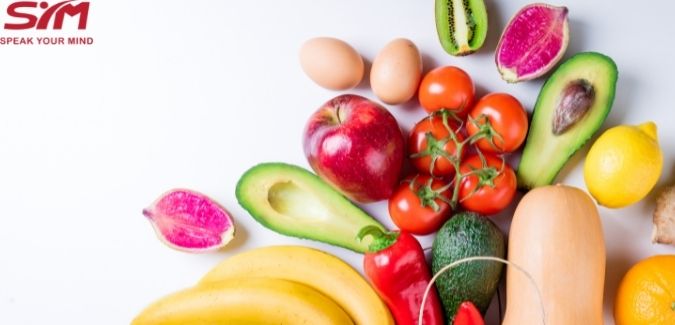
| Food production has become increasingly industrialized and globalized, and so knowing that our food contains has become more and more important. Labels do not always help. Adjectives such as wholesome (1),’ farm fresh’ and ‘homemade’ can be rather vague and meaningless, while the international numbering system for additives (2) is often incomprehensible to people, so familiar descriptions, however, do have a clear official meaning, for example, whole foods (3) ‘free-range (4) eggs, gluten-free (5) bread or’ contains no artificial colors or preservatives (6) and scientifically accurate descriptions can be vital for people who suffer from food allergies (7) and for vegetarians or vegans (8) who want to know exactly what is in a product, as well as being important for consumers looking for natural or unprocessed (9) foods, or those concerned about animal welfare (10) who may wish to avoid food produced by battery-farming (11) methods and so on. With the growth in popularity of convenience foods (12), alongside public health concerns over bad diet and obesity, simple and unambiguous nutrition labels (13) are more important than ever. An example of a simple system is traffic-light labeling (14), which indicates high (red), medium (amber) or low (green) levels of such things as fat, sugar and salt. Finally, good labeling tells us where the food was produced and under what conditions, for example, fair trade (15) products. |
1: good for you (tốt cho sức khỏe)
2: substance added to food to improve its taste or appearance or to preserve it (chất phụ gia)
3: foods that have not had any of their natural features taken away or any artificial substances added (thực phẩm chưa qua tinh chế)
4: produced by farm animals that are allowed to move around outside and are not kept in cages or stalls (chăn nuôi thả vườn)
5: not containing a protein which is contained in wheat and some other grains (đồ ăn không chứa gluten)
6: chemicals used to stop food from decaying (chất bảo quản)
7: a condition that makes a person become ill or develop skin or breathing problems because they have eaten certain foods or been near-certain substances. The related adjective is allergic (to). (dị ứng)
8: a person who does not eat or use any animal products, such as meat, fish, eggs or cheese (người ăn chay)
9: which have not been treated with chemicals that preserve them or give them extra taste or color (đồ ăn qua chế biến)
10: taking care of animals (sức khỏe động vật)
11: system of producing a large quantity of eggs or meat cheaply by keeping a lot of birds in rows of small cages (doanh trại chăn nuôi)
12: foods that are almost ready to eat or are quick to prepare (thực phẩm tiện lợi)
13: labels that indicate how the food influences your health (nhãn thông tin dinh dưỡng)
14: labels with colors like traffic lights that give information on nutrition (đánh dấu dinh dưỡng)
15: a way of buying and selling products that make certain that the original producer receives a fair price (Công bằng thương mại)
FOOD METAPHORS (NHỮNG PHÉP ẨN DỤ LIÊN QUAN TỚI ĂN UỐNG)
- Inviting Sophie and her ex-husband to the same party was a recipe for disaster. (situation sure to lead to: yếu tố dẫn đến thất bại/ thảm hoạ)
- When asked why he didn’t turn up to the exam, he cooked up a story about his kitchen being flooded. (make up, invent: chế ra, bịa ra)
- The film has all the ingredients of a box office hit. (all the necessary characteristics: tố chất, yếu tố)
- I’m not going to call him. I’m going to let him stew for another few days at least. (worry or suffer, especially about something you think is that person’s fault; you can also say stew in your own juice: chịu đựng, lo lắng)
- It’s kind of you to invite me, but ballet isn’t really my cup of tea. (not the type of thing that I like: kiểu yêu thích)
- The police grilled the suspect for hours, but eventually let him go. (asked a lot of questions: thăm dò, hỏi cung)
- I’m sure this is going to be another of his half-baked schemes that will never come to anything (unrealistic or not thought through properly: làm không ra đâu vào đâu, nửa vời)
- Let’s hire a karaoke machine – that’ll spice up the office party. (make more lively: làm sống động, làm mới)
- Rick has started hanging around with some unsavory characters. (unpleasant, morally offensive: khó ưa)
- They started their business with high hopes but things soon turned sour. (go wrong: có vấn đề)
- Let’s go for a coffee and you can tell me all the juicy gossip. (exciting and interesting: thú vị, hay ho)
(Nguồn tham khảo: Vocabulary in use Upper-Intermediate, Vocabulary in use Advanced, Oxford word skills Intermediate, Cambridge dictionary)
Trên đây, SYM English đã giới thiệu cho bạn các 100 từ vựng tiếng Anh chủ đề Food, bạn có thể áp dụng các từ vựng này vào trong giao tiếp tiếng Anh hằng ngày. Đừng quên đón đọc các bài viết tiếp theo của chúng tôi để cập nhật các kiến thức tiếng Anh hữu ích bạn nhé!
Trong quá trình sử dụng tài liệu của SYM, các bạn có góp ý hoặc cần hỗ trợ các bạn hãy liên hệ Fanpage SYM English để nhận hỗ trợ nhanh nhất từ sym.edu.vn.
Để có thêm nhiều tài liệu học IELTS hơn các bạn vào Group Facebook để tải!
Đăng ký kênh youtube : https://bit.ly/dang-ky-kenh-SYM để xem nhiều video có ích giúp bạn tăng band điểm cao hơn.
SYM English chúc bạn học IELTS thật tốt với bài viết từ vựng tiếng anh chủ đề Food.
Ms. Nguyễn Thị Thu Hương (IELTS 8.0)
